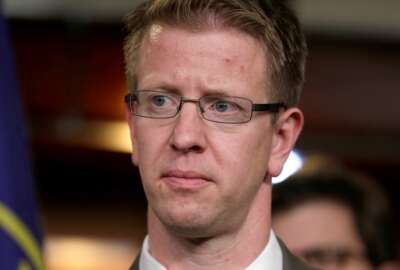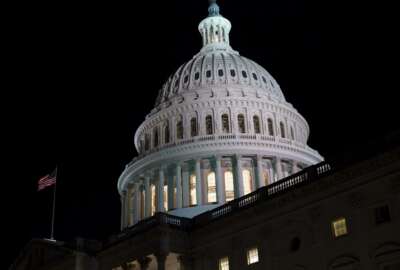
The burners are lit, but the budget debates on Capitol Hill are just warming up
A busy and contentious agenda on Capitol Hill doesn't mean the budget and priorities for your agency are off the table. In fact, the House budget committee...
Best listening experience is on Chrome, Firefox or Safari. Subscribe to Federal Drive’s daily audio interviews on Apple Podcasts or PodcastOne.
A busy and contentious agenda on Capitol Hill doesn’t mean the budget and priorities for your agency are off the table. In fact, the House budget committee Chairwoman says she’s hoping to have bills on the floor this summer. Federal Drive with Tom Temin got more now from Bloomberg Government congress reporter Jack Fitzpatrick.
Interview transcript:
Tom Temin: Jack, good to have you on.
Jack Fitzpatrick: Yeah, thanks for having me.
Tom Temin: And I wanted to start with the defense budget, because we have seen in the so called skinny budget, although the white house doesn’t like that term. So I use it as often as I can a very small increase, basically the cover pay raises for military personnel next year. And the republicans haven’t really countered back on that. But clearly, they would want more than that, since there have been larger increases pretty much in the last several years. So how is that battle all shaping up? And what might be the realistic outcome here?
Jack Fitzpatrick: Yeah, that’s gonna be a really big fight in Washington, I think for the rest of the fiscal year, Republicans have talked generally about a three to 5% increase. So you could imagine them pushing for something going from the 740 current range to the 770 to 80 billion range. But it is also important that there’s a significant group of progressives that want a significant cut rather than this more or less flat budget. And people like Barbara Lee from California are saying we should cut this by 10%. Now, given the narrow margins that Democrats have in the House and Senate, you really kind of need a lot of Democrats, and a lot of Republicans end up agreeing on something to have it become law. So that’s a really wide Delta, I think Republicans probably have more momentum behind them. Because if you just look at past spending deals, it’s easier to get Democrats to agree with Republicans on a defense boost, then it’s very hard to imagine enough Republicans in the Senate to get 60 votes on a defense decrease. But right now, it looks like there’s a huge gap between the sides. And there are enough people who aren’t happy with the Biden proposal. So they’re gonna have to really do a lot of negotiating on that.
Tom Temin: And although it’s only somewhat related, we don’t really know how the discussions and ideas for the 2022 authorization bill either would go, then,
Jack Fitzpatrick: yeah, that’s something else that is going to be the subject of debate tied into the defense budget. And also, you know, this announcement about pulling out from Afghanistan, and a push, again, from progressives who want to see, and there’s some openness from Republicans to this, but who wants to see an end to the 2001 and two, au Ms. Authorization for Use of Military Force. So while in many cases, the Biden administration generally is pushing for a sort of back to normal approach on foreign policy and wants to take it easy after sort of a back and forth for years under Trump, we’re getting into some of the big picture fights on defense policy and foreign policy that do look like they’re going to be pretty tough for the rest of the year.
Tom Temin: Yeah, the old fashioned looking fights, not some of the new ones that have come onto the scene in recent years in politics. And let’s move over to the Veterans Affairs Department. Because you’re reporting that Secretary Denis McDonough says he’s open to accounting maneuvers, some things might be off budget, what is that all about?
Jack Fitzpatrick: Yeah, this sounds at first, like it’s really inside baseball. But I do promise it’s it’s really important when you’re looking at the federal budget. A few years ago, when they passed the VA mission Act, which gives more flexibility for veterans to seek care at non VA facilities and tried to improve VA care, they switched some money from mandatory funding, which is basically on autopilot. And you put it at a formula to meet certain goals to discretionary which means Congress debates it year in and year out. Veterans Health funds are rising, especially with the greater focus on paying for them to be able to go to non VA facilities, Democrats and some Republicans for a while have said if we lump this in with all the other discretionary funding, this growing funding need is going to crowd out everything else. And we’re gonna have to make cuts elsewhere. conservative Republicans have essentially said, Good, we probably should. But this is a big debate now that Denis McDonough said, Look, I’d be open to taking this off budget or switching it back to mandatory or somehow not lumping it in with all the other discretionary budget needs. And I know there are some Republicans, Richard Shelby, the top republican appropriator in the Senate has said, you know, that kind of thing is something you could be open to whether a budget cap exemption in past years or what have you, but this is the kind of thing that has held up budget agreements in 2019. Last year, it’s been a big issue for them to negotiate through because the rising healthcare costs for veterans sort of being pitted against other things that lawmakers want to fund.
Tom Temin: And of course, infrastructure on everybody’s lips, everyone has a different definition of what qualifies as infrastructure. But finally, we’re seeing a republican counter proposal to what the democrats have proposed, rather than just outright rejection of the whole idea. What is shaping up on that side of the aisle?
Jack Fitzpatrick: Yeah, we’re in the very early stages, but somewhat promising early stages. Senator Shelley Moore, Capitol republican from West Virginia, who’s the top republican on the environment, Public Works Committee has said, Look, this is just a ballpark but something in the range of 600 to 800 billion for old school infrastructure, roads, bridges, that kind of thing, is something that she thinks Republicans could get on board with. There actually was a little bit of positive reception from Democrats, including Peter de Fazio, the transportation infrastructure Chairman in the house, to that kind of thing. One of the pitfalls there, though, is really the problem Republicans had with Biden’s two and a quarter trillion proposal was the size and scope and the fact that he wanted to pay for it with a corporate tax rate increase. If they put out this counter proposal and even get some bipartisan work on an infrastructure infrastructure bill, Democrats could pass a bipartisan piece, and then just try to do another one by themselves, seeing what they could do through the budget reconciliation process in a partisan way. So there already are some critics, Lisa Murkowski has said, she doesn’t like the counter proposal idea. They just need to have bipartisan talks right from the beginning, there is some risk for Republicans, because we don’t know how many shots democrats are going to take at this. And if Republicans want to keep the cost relatively small, it’s really up to Democrats, because they have the majority. So they could just keep introducing other bills to fill out everything else they want.
Tom Temin: Sure, okay. And maybe someday a bridge will get built, if we’re lucky, sooner or later. And just a brief item, the capital security spending itself, because everyone likes the Capitol grounds and whether you like the occupants or not, it’s a really nice part of Washington. And so the fencing and all of that gets tied in with the Capitol Hill police. What is the outlook for getting that one settled?
Jack Fitzpatrick: Yeah, I know, the fencing is a big concern locally and actually was a little bit politicized lawmakers criticizing Pelosi for having the temporary fencing up for so long, the official recommendations called for retractable fencing or temporary fencing that they could put up so that it’s not always up there. But if there are emergency needs, they could go to it. There hasn’t been a lot of talk between the House and Senate yet there was initially a push to try to get this bill done. It looks like it would be about in the $2 billion range in April, it’s now getting pushed back to May. And everything we’ve heard from the Senate side is that the House Democrats just haven’t communicated that much on the details. So they’re slow walking it a little bit compared to what we heard originally, but probably this spring, we are going to see some sort of bill with extra spending resources for Capitol security. And on the federal budget itself for 2022. Again, the White House full proposal will come out at some point. But it’s really Congress’s bailiwick to pass those bills.
Tom Temin: We’re hearing from the appropriations chair, in the House anyway, some sort of a timetable.
Jack Fitzpatrick: Yeah, they want to Rosa DeLauro, the House Appropriations chair wants to at least get the house bills to the floor by July. That’s sort of making up for a slow start, although there usually is a slow start when a new administration comes in. So we waited a while on this discretionary budget proposal. We’ll get one with more details sometime in the next few weeks or a couple months. We really don’t know yet. But at least we’re at the point where the appropriators are holding their hearings, they can start working on their bills, at least conceptually, as I said, they’re all these fights over what the top line numbers should be. So they’ve got a ways to go. But at least now we have a goal set that they could try to get bills to the floor by July, which would make it possible to potentially get something done by the September 30 deadline, although they usually don’t do a good job with that.
Tom Temin: Jack Fitzpatrick is Congress reporter for Bloomberg Government. Thanks so much for joining me.
Jack Fitzpatrick: Thanks for having me.
Copyright © 2024 Federal News Network. All rights reserved. This website is not intended for users located within the European Economic Area.
Tom Temin is host of the Federal Drive and has been providing insight on federal technology and management issues for more than 30 years.
Follow @tteminWFED
Related Stories

White House running out of time to restore functionality to MSPB, congressmen warn




